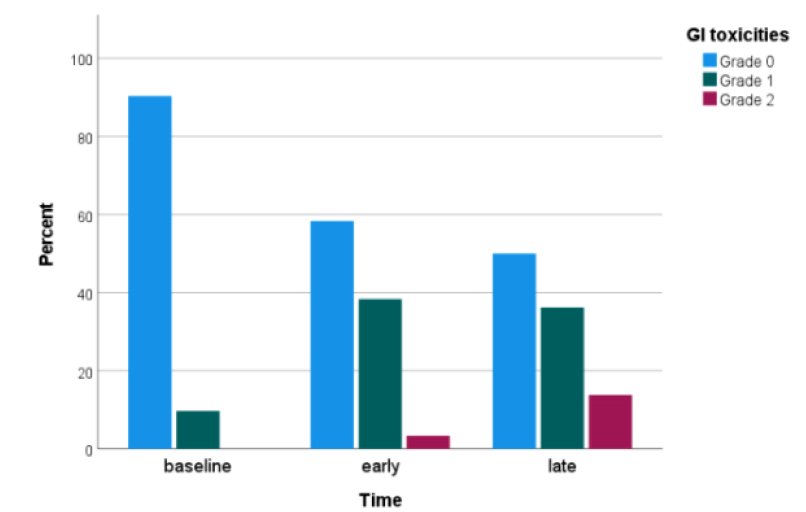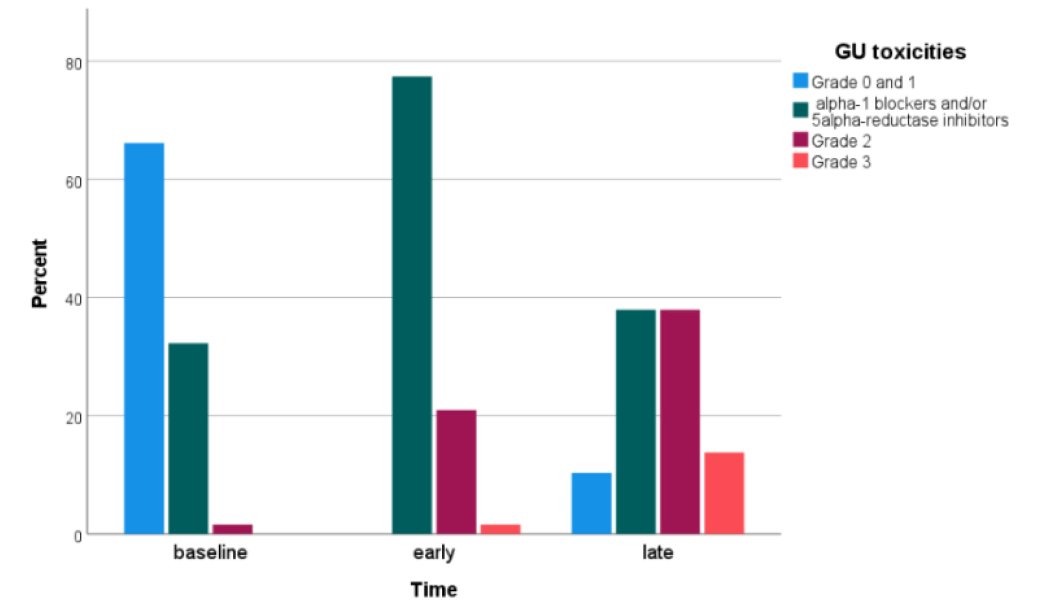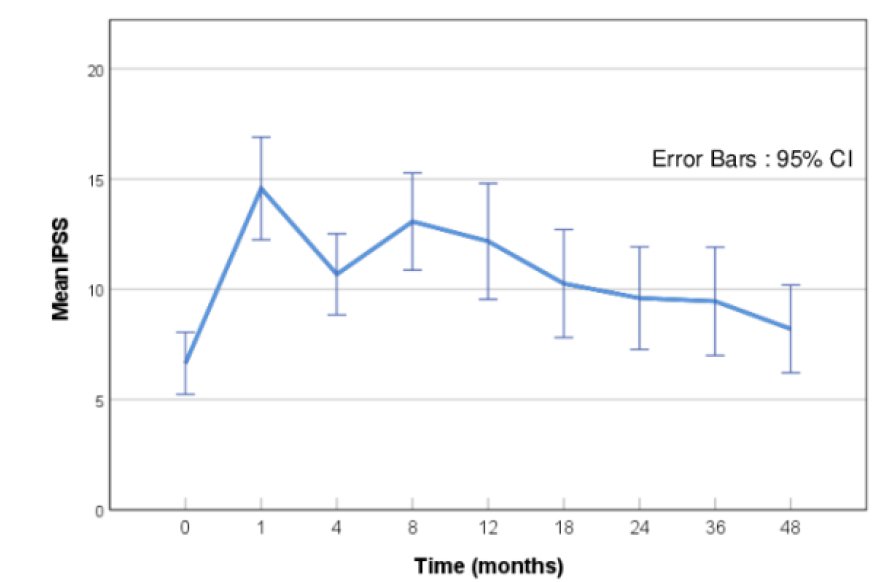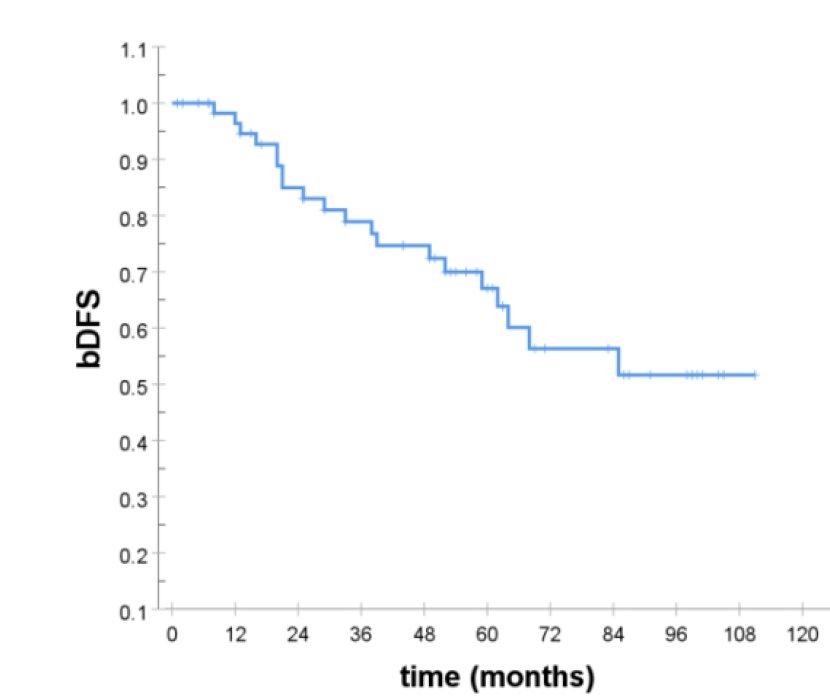(UroToday.com) The 2022 ASTRO annual meeting featured a prostate cancer session, including a presentation by Dr. Maxence Cloutier discussing 5-year toxicity and outcomes of a pilot study of salvage HDR brachytherapy in recurrent prostate cancer. Until recently, androgen deprivation therapy (ADT) was the main treatment option for recurrent prostate cancer after primary radiation treatment. However, ADT is not curative and is associated with several side effects. Local ablative therapy can be curative and reduce long-term side effects associated with ADT. Dr. Cloutier and colleagues designed a single-institution prospective pilot study to evaluate the toxicities and outcomes of HDR brachytherapy as a salvage local therapy.
There were 62 patients with biopsy-proven local relapse after a previous treatment with radiation included in this study. A negative bone scan and CT scan of the abdomen and pelvis at the time of relapse was mandatory. The primary objective was to assess both early and late genitourinary and gastrointestinal toxicities. Biochemical disease-free survival was also assessed as a secondary objective, and toxicities were reported using CTCAE v5 scale and the IPSS scoring system. Short-course ADT could be used if deemed clinically indicated by the physician. The HDR brachytherapy regimen was 32 Gy delivered in 4 fractions to the whole prostate and, for the last 12 patients recruited, 27 Gy in 2 fractions administered focally, due to concerns with toxicities. CT-based treatment planning using an inverse planning algorithm was performed for patients with whole prostate treatment (n = 50). Real-time ultrasound-based treatment planning was used for patients undergoing focal salvage radiation (n = 12).
The overall median follow-up was 63.0 months. Gastrointestinal toxicities were acceptable with 3.3% and 13.8% of patients experiencing early and late grade 2 toxicities. No grade 3 gastrointestinal toxicities were reported:

Early grade 2 genitourinary toxicities were overestimated at 100% (all patients used an alpha-blocker in the postoperative setting) and one patient had grade 3 early toxicity. Late genitourinary toxicities were significant, with 13.8% of patients experiencing late grade 3 toxicity:

Of interest, the use of ADT before HDR brachytherapy (n = 18) was associated with lower genitourinary toxicities (no grade 3) although the association was not statistically significant (Chi-Square p-value 0.184). Mean IPSS at 1 month follow-up was 14.6 and then decreased under 10 after 24 months:

Good biochemical control was achieved with a biochemical disease-free survival of 74.4% at 48 months, and a biochemical disease-free survival at a median follow-up of 63.0 months:

Dr. Cloutier concluded this presentation discussing 5-year toxicity and outcomes of a pilot study of salvage HDR brachytherapy in recurrent prostate cancer with the following take home messages:
- Salvage HDR brachytherapy after primary radiation to the prostate offers good biochemical control but at the cost of significant grade 3 genitourinary morbidities
- Patients can benefit from local therapy after primary radiation but whole-gland radiation should be used with caution because of concern with toxicities
- Focal therapy to partial gland might be a good alternative to achieve local control and avoid severe toxicities
Presented by: Maxime Cloutier, CHU de Québec - Université Laval, Quebec City, QC, Canada
Co-Authors: D. Carignan2, M. C. Lavallee3, A. G. Martin3,4, E. Vigneault5,6, and W. Foster3,5; 1CHU de Québec - Université Laval, Quebec City, QC, Canada, 2Research Centre CHU de Québec-Université Laval, Quebec, QC, Canada, 3Department of Radiation Oncology CHU de Québec-Université Laval, Québec, QC, Canada, 4Centre de recherche sur le cancer, Université Laval, Quebec, QC, Canada, 5Radiation Oncology, CHU de Quebec, Quebec, QC, Canada, 6CHU de Quebec-L'Hotel-Dieu de Quebec (HDQ), Québec, QC, Canada
Written by: Zachary Klaassen, MD, MSc – Urologic Oncologist, Assistant Professor of Urology, Georgia Cancer Center, Augusta University/Medical College of Georgia, @zklaassen_md on Twitter during the 2022 American Society of Radiation Oncology (ASTRO) Annual Hybrid Meeting, San Antonio, TX, Sat, Oct 22 – Wed, Oct 26, 2022.


